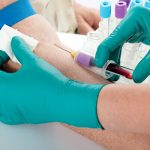By David Blyweiss, M.D., Advanced Natural Wellness
Even though there are dozens of trials and dozens more ready to be done, the idea that men go through male menopause – or “manopause” – isn’t totally accepted in the medical community. It’s not even accepted by a lot of men.
Does that make it any less real?
In women, menopause is basically ovarian failure. The levels of female hormones produced by the ovaries plunge, her menses stop, and she is no longer fertile.
In men, manopause is a failure of testicular function. The testicles can’t produce enough male hormones, such as testosterone. This may affect sperm count but it doesn’t spell the end of fertility. You’ve got plenty of 50, 60, 70 and 80-year-old fathers out there.
But the difference of one letter doesn’t really mean that much difference in how you feel when your reproductive hormones begin to decline. Depression, fatigue, irritability, weight gain and even hot flashes happen in both sexes. And in many cases men have the added complication of erectile dysfunction.
One of the official names for male menopause is hypogonadism, which simply reflects the testicles not producing a level of testosterone previously seen and taken for granted.We also use the term “andropause.”
But no matter what you call it, it can be compounded by a number of hormonal disturbances besides testosterone. As men age, ALL hormone levels slowly decline, including DHEA (dehydroepiandrosterone) and cortisol.
At the same time, hormone binding globulin (SHBG) often goes up. This hormone binds testosterone so that the lowered level of circulating testosterone isn’t even free to be used in the body.
So you’ve got all of these hormones out of whack and it’s no wonder you feel crappy or angry and aren’t sleeping well… that you’re getting fat, have no energy and can’t get the erection you want.
Is Male Menopause Inevitable?
Every woman knows she is going to go through menopause. And she understands exactly what it is when it happens.
But not all men will experience manopause. And men who are squarely in the grips of it may not realize why they feel so lousy.
The Endocrine Society estimates that approximately 35% of men older than 45 years of age – and 30% to 50% of men with obesity or type 2 diabetes – have hypogonadism. In most clinical trials, the cut off value used to define hypogonadism is testosterone levels of 300 ng/dl or below.
There is a reason why obesity and diabetes, which go hand-in-hand, increase the risk of low testosterone levels.
You see, there is a huge link between body fat and testosterone. That’s because body fat contains aromatase enzymes that convert (aromatize)testosterone into estrogen. At the same time, low testosterone levels add to body fat. So it’s a two-way street. More fat means less testosterone, and less testosterone means more fat; similar to more testosterone meant more muscle mass and vice versa in our teens and twenties.
It’s even worse if you eat a standard American diet that is high in processed carbohydrates. These are the kind of carbs that pack on the belly fat and contribute to type 2 diabetes. That belly fat, more than any other kind of fat, suppresses testosterone levels.
If you are sedentary at the same time, you are suppressing your male hormone even further. And if you’re taking a statin and your cholesterol drops below 100, you’re going to have problems making other hormones from the steroidogenic pathway on down.
So no, male menopause is not inevitable. More importantly, there are things you can do to help your own body produce more testosterone.
Simple Changes Make a Big Difference
Nobody wants to make a lot of big changes in their lifestyle overnight. But when you keep it simple and focus on the most important elements, it can be pretty easy to do.
If you’re overweight, start working to get those excess pounds off. Remember, excess weight means less testosterone, and less testosterone means more weight gain. So it can be a pretty vicious cycle.
If you need some motivation, just consider this. A while back nearly 900 pre-diabetic middle-aged men were divided into three groups.
One group exercised for 150 minutes a week and made dietary changes. The second group was given the diabetes drug metformin. And the third received a placebo.
The men who exercised and changed their diet lost an average of 17 pounds. And that weight loss had a huge impact on their testosterone levels. The presence of low testosterone among the men decreased by 46%! That didn’t happen with the men in the other groups.
Keep in mind that it’s those high glycemic carbs you have to watch out for. They not only interfere with testosterone production; they also affect your blood sugar levels – another underlying cause of testosterone loss.
So choose a healthy, mostly plant-based diet. And make sure to add plenty of cruciferous vegetables to your plate. Broccoli, Brussels sprouts, collard greens and cauliflower all contain a compound that boosts testosterone production by flushing excess estrogen out of your body.
You also want to make sure you’re performing the right kind of exercise. It’s muscle strengthening and muscle stress that builds testosterone levels. So strengthening exercises like weightlifting, rowing and squats are great.
Then, as your testosterone levels rise, you will build more muscle mass. The more muscle mass you gain, the higher your testosterone will climb. It’s what we call a bidirectional pathway.
But start off slow and steady. Both overtraining and under-eating will wreck your testosterone levels by increasing SHBG which binds testosterone so that it’s not free to be used in the body.
I’ll be sharing more key points about testosterone loss with you in the next week or two. So keep your eyes on your inbox to learn what your treatment options are.
SOURCES:
Hypogonadism in Men. Endocrine Society. Jan 2022.
Dandona P, Rosenberg MT. A practical guide to male hypogonadism in the primary care setting. Int J Clin Pract. 2010 May;64(6):682-96.
Fui MN, Dupuis P, Grossmann M. Lowered testosterone in male obesity: mechanisms, morbidity and management. Asian J Androl. 2014 Mar-Apr;16(2):223-31.
Lee HK, Lee JK, Cho B. The role of androgen in the adipose tissue of males. World J Mens Health. 2013 Aug;31(2):136-40
Hu TY, Chen YC, Lin P, Shih CK, Bai CH, Yuan KC, Lee SY, Chang JS. Testosterone-Associated Dietary Pattern Predicts Low Testosterone Levels and Hypogonadism. Nutrients. 2018 Nov 16;10(11):1786.
Endocrine Society. Overweight men can boost low testosterone levels by losing weight. ScienceDaily. June 2012. Hwang C, Sethi S, Heilbrun LK, Gupta NS, Chitale DA, Sakr WA, Menon M, Peabody JO, Smith DW, Sarkar FH, Heath EI. Anti-androgenic activity of absorption-enhanced 3, 3′-diindolylmethane in prostatectomy patients. Am J Transl Res. 2016 Jan 15;8(1):166-76.






